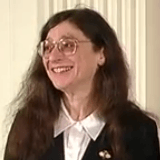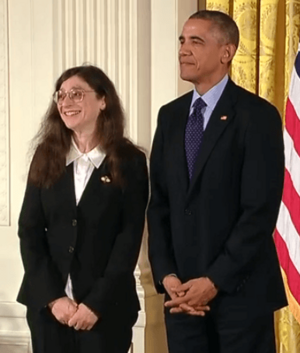May Berenbaum facts for kids
Quick facts for kids
May Berenbaum
|
|
|---|---|

May Berenbaum, 2014
|
|
| Born | July 22, 1953 |
| Nationality | American |
| Alma mater | |
| Awards |
|
| Scientific career | |
| Fields | Entomology |
| Institutions | University of Illinois Urbana-Champaign |
| Thesis | Furanocoumarin Chemistry, Insect Herbivory, and Coevolution in the Umbelliferae (1980) |
| Doctoral advisor | Paul Feeny |
May Berenbaum is an American entomologist, a scientist who studies insects. She is a professor at the University of Illinois Urbana-Champaign. Her work focuses on how insects and plants interact using chemicals. She studies how these interactions affect nature and how different species change over time.
Professor Berenbaum is very interested in nectar, special plant chemicals called phytochemicals, honey, and bees. Her research helps us understand more about beekeeping and how to keep bees healthy. She is a member of important science groups like the National Academy of Sciences. In 2014, she received the National Medal of Science, which is a very high honor for scientists in the United States.
Contents
Early Life and Education
May Berenbaum was born on July 22, 1953. She went to Yale University and graduated with high honors in biology in 1975. At first, she didn't plan to study insects. She took a class about land insects because it fit her schedule.
She also took a class about plant chemistry and found she loved that too. Later, she heard a talk by a scientist named Paul Feeny about "chemical ecology." This is the study of how living things interact using chemicals. May decided to combine her interests in insects and plants. She then went to Cornell University to get her PhD, with Paul Feeny as her advisor. She earned her PhD in ecology and evolutionary biology in 1980.
Research on Bees and Honey
Professor Berenbaum is famous for her research on honey and its importance for bees and wasps. Honey is not just food; it's also like medicine for bees. There are about 20,000 known bee species, but many bee populations are shrinking. This is a problem called colony collapse disorder.
Her research has shown that honey contains special plant chemicals, or phytochemicals, that help bees in many ways. These chemicals can help bees stay warm, fight off harmful chemicals, resist infections, heal their wounds, and even live longer. Some important phytochemicals she studied include p-coumaric acid, quercetin, and caffeine. She also found that sick honeybees will choose to eat the type of honey that has the right chemicals to help them feel better.
Helping Bees Stay Healthy
Professor Berenbaum's work has important lessons for beekeeping. One key idea is that bees need many different kinds of flowers. When bees collect nectar from a wide variety of flowers, they make honey with more diverse chemicals. This makes the bees healthier.
She also suggests that beekeepers should leave different types of honey for their bees. This way, bees have a "honey pharmacy" to choose from when they are sick. This helps bees get the specific chemicals they need to recover.
Career Highlights
Since 1980, May Berenbaum has been a professor in the entomology department at the University of Illinois Urbana-Champaign. She has been the head of the department since 1992.
In 1996, she became a member of the American Academy of Arts and Sciences and the American Philosophical Society. She also worked as an editor for important science journals. From 1997 to 2018, she edited the Annual Review of Entomology. In 2019, she became the editor-in-chief of the Proceedings of the National Academy of Sciences, which is a very important science journal.
She has also led committees for the National Research Council. These committees looked at important topics like the future of pesticides in farming (in 2000) and the health of pollinators like bees (in 2007).
Books and Public Engagement
Professor Berenbaum has written many articles and books about insects for everyone, not just scientists. Some of her books include:
- Ninety-nine gnats, nits, and nibblers (1989)
- Ninety-nine more maggots, mites, and munchers (1993)
- Bugs in the system: insects and their impact on human affairs (1995)
- Buzzwords: a scientist muses on ..., bugs, and rock'n roll (2000)
- Earwig's tail: a modern bestiary of multi-legged legends (2009)
- Honey, I'm homemade: sweet treats from the beehive across the centuries and around the world (2010)
She is also known for organizing the Insect Fear Film Festival at the University of Illinois Urbana-Champaign. This festival shows movies about insects and helps people learn more about them in a fun way.
Personal Life
May Berenbaum is a vegetarian. This means she does not eat meat. While she has studied and taught her students about entomophagy (the practice of eating insects), she does not eat insects herself.
Awards and Honors
May Berenbaum has received many awards for her important work:
- A character in the TV show The X-Files was named after her: Dr. Bambi Berenbaum, an entomologist.
- In 1996, she received the Distinguished Teaching Award from the Entomological Society of America North Central Branch.
- She was given the prestigious Ecological Society of America Robert MacArthur Award in 2004 for her great contributions to ecology.
- In 2009, she received the Public Understanding of Science and Technology Award from the American Association for the Advancement of Science.
- She is an Honorary Member of the British Ecological Society.
- In March 2011, she was awarded the University of Southern California's Tyler Prize for Environmental Achievement.
- In 2012, she was named a Swanlund Chair at the University of Illinois, which is a very high honor for a professor.
- Also in 2012, she received the Edward O. Wilson Biodiversity Technology Award.
- In November 2014, a new species of cockroach was named after her: Xestoblatta berenbaumae.
- On October 3, 2014, President Barack Obama gave her the National Medal of Science. She received the medal at a White House ceremony on November 20, 2014.


